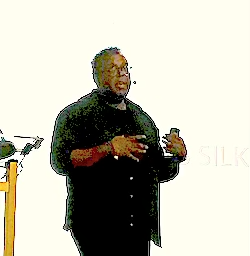Copyright collecting societies may be on their way out, as a new era of digital rights management looms.
Paying music rights for new audio delivery formats such as podcasts and online DJ mix shows has so far been too difficult, so music is generally not heard in these new forms of audio programming.
Radio stations also routinely cut out the music when their shows are repackaged for catch-up replay due to royalty issues, and geo-block live streams because paying for content in other jurisdictions is too difficult or too expensive.
If you put commercially produced music on Soundcloud or Youtube you will likely get a take down notice and your account may be closed if you have too many strikes against you.
It’s a mess.
Legitimate radio and audio production companies that want to do the right thing and pay for what they put on these new platforms are not easily able to do so because of the manual collective bargaining approach of copyright collecting societies or the long winded process of getting individual rights clearances.
Enter blockchain technology.
Blockchain encryption is the same virtual technology that is enabling crypto-currencies such as Bitcoin to disrupt the archaic banking industry. For centuries banks have had a monopoly on money movements due to the high barriers to entry (ie. the need to have lots of money) and the level of trust required to move money around the economy. Once banks had successfully monopolised the monetary system, they made their profits from investing other people’s money and taking a cut of every transaction.
Blockchain is changing all that. Its verifiable, open sourced, transparent encryption allows anyone with enabled software to verify ownership, money transfers and payments between two parties. Quickly and Automatically.
It is this new ability to label content with your identity and automatically link that content with secure transparent payment systems that will revolutionise rights management. It may eventually cut out the manual identification and payment process currently run by collecting societies. Over many decades these collecting societies have fought for the rights of artists and collected money on their behalf. The system that worked pretty well, despite occasional robust negotiations and despites over just how much should be paid, but it was a slow and resource intensive way of identifying and collecting money owed to musicians by radio stations, venues and content producers.
Blockchain takes the people out of the equation, speeding up the process and potentially allowing rights holders to label and price their own content.
Imaging this: I write and record a song, and when I export that song to a sound file I enter the song name, my personal details, bank account information and put a price on each play. I might set the charge at 2 cents per play on a radio station, 1 cent per 100 podcast plays, 2 cents per play on a live stream, 10 cents per 100 plays on Soundcloud and Youtube, 20 cents per 100 plays on Spotify, Pandora or Deezer, and 50 cents per play if my song is embedded in someone else’s video or mix tape.
When my song is played anywhere, the playout system recognises the metadata and contacts my blockchain to register a payment based on the charges I specified. If the station or production company doesn’t want to pay that much, their playout system flags that I have asked too much and chooses another song. All in just a few seconds.
Around the world, experts in the world of copyright, streaming and broadcasting are all discussing just how to implement the benefits of this new technology.
In Barcelona last week, APRA’s was represented on a panel discussion about it at the Summus Conference and the radio industry was discussing it at the International Radio Festival in Malta
Innovations coming our way include Dubset’s partnership with Soundcloud, announced last week, that partners the new digital rights tools of Dubset with Soundcloud’s audio platform.
Dubset’s rights management and clearance capabilities are expected to reduce complexity for the content creator while ensuring rights holders are properly identified and paid, improving the currently unsatisfactory ‘strike’ system that is Soundcloud’s current blunt instrument for rights control.
DJs who produce mixes are looking forward to the new innovation because it will give them a chance to deliver their content to listeners on new platforms without having to risk their mixes being taken down for rights violations. Shows that interview musicians will soon be able to leave in the music they have talked about with the artists, rather than cutting it out when the program is uploaded to podcast.
British DJ Carly Wilson, from SISTER COLLECTIVE, is an example of someone who has had trouble with the current rights management system and is anxiously awaiting something better:
“Musicians gave me music and wanted me to play it… In the early days my Soundcloud got deleted and it took me a long time to get it back… I had to go back on all the strikes and get that cleared by the musician or the publisher… when to comes to putting your content on major platforms you run into problems.
“I’ve discovered Dubset, which highlights the tracks played and filters the royalties back to artists… they are working with the major streamers to create a new system.
“It might be that the musician said fine use it, but the publisher comes in and says we haven’t cleared it… Dubset could solve the problem for the publishers like Soundcloud, the musicians and the DJs.”
Dubset’s platform analyzes content from music creators identifying the use of original recordings within remixes, samples and mixes, assigning full rights to the original rights holders and claiming all revenues from the new content for those artists and composers. Dubset currently performs its services for thousands of label and publishing rights holders, claiming new royalties for over 35 million pieces of original music.
Speaking at the International Radio Festival, lawyer Cliff Fluent, a former radio employee and music rights specialist explained how block chain can work for music broadcast rights in the future:
 “This has been one of the biggest inventive steps since the world wide web. It takes out the middle person.
“This has been one of the biggest inventive steps since the world wide web. It takes out the middle person.
“A transaction is requested, then the system breaks it up and recreates it at the other end. All of the nodes are known and validated and that’s what creates the trust. It breaks it into a block for security and there is a chain to make it known that it is unified. That’s how digital crypto-currencies work.
“It is a shared trusts public ledger that everyone can inspect but which no single user controls. No singe person or bank controls it. It enables a currency without a bank.
“This gets really interesting with smart contracts. For example you could use it to send smart birthday present cash that can only opened by the recipient on their birthday… and musicians can use it for a direct relationship between them and radio stations or streamers…
“It is a fantastic opportunity for the media industry to use this metadata for rights management… In media we spend far too long understanding where content comes from and distributing royalties. Many in the audio industry believe it is an opportunity to take back control.”
A range of companies are breaking new ground in the field of music rights payments using the new technology:
JAAK – has looked at the mess that is music rights and is building a system using blockchain tech to ensure that content can be licenced rapidly and agents paid quickly.
Audius – a type of soundcloud on blockchain for attribution of content and distribution to platforms via instant monetisation. Using Audius creators can generate unchangeable timestamped records for their creative works and register them with the Audius network for claims.
An innovative smart speaker called Volareo is linking plays with payments using bloackchain technology. with Volareo you get a speaker, a hub and access to the world of crypto commerce & content. If you like a song you have heard clap 3 times to tip the artist and money will be transferred to reward the artist directly.
The world of block chain encryption is about to disrupt the old system of collecting royalties and paying artists. Stand by for the revolution.
 Steve Ahern
Steve Ahern
Main image: Licenced from Shutterstock. Other images: S Ahern, radioinfo.

